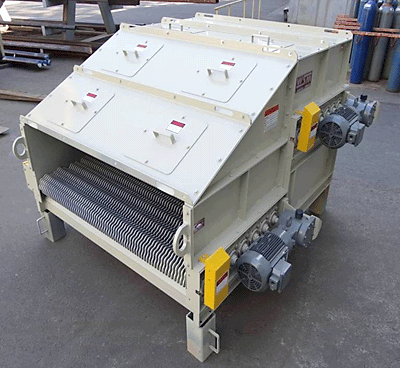 West Salem Machinery, Salem, Ore., USA, this week announced a new screening design called the Waterfall™ Disc Screen. The new arrangement utilizes two or more screening decks that agitate and tumble the mat of material being screened as it falls from level to level. This tumbling movement is similar to a waterfall in that the mat is blended as it falls and fine particles that were in the upper portion now have a chance to be screened on the lower deck.
West Salem Machinery, Salem, Ore., USA, this week announced a new screening design called the Waterfall™ Disc Screen. The new arrangement utilizes two or more screening decks that agitate and tumble the mat of material being screened as it falls from level to level. This tumbling movement is similar to a waterfall in that the mat is blended as it falls and fine particles that were in the upper portion now have a chance to be screened on the lower deck.
To make this possible, West Salem developed a disc screen shaft manufacturing method that creates a tighter spacing between the discs, allowing the chipped or hogged materials to be sorted by size (thickness and length), but at a smaller dimension than in the past. Dust, dirt, and fine particles pass between the discs, while desirable and acceptable materials are retained above. This concentrates the fines and dirt so that they can be diverted from the process, or they can be re-screened to recover the maximum amount of organic material.
In particleboard manufacture where dryer efficiency and pellet properties are so dependent on material thickness and size, the Waterfall Disc Screen has an important role to play in sorting the sawdust and fine particles for optimum performance, often in combination with vibratory or shaker screens also manufactured and supplied by West Salem Machinery.
The Waterfall Disc Screen design is available for processing a variety of materials, including wood products, agricultural waste products, and any granular organic material where fines and dust are a problem. The welded discs are fixed to a sturdy tubular shaft, with large journals and bearings supporting and driving them from outside of the dust-proof screen frame. The modular nature of this arrangement makes it easy to combine different sections, and to use different disc spacing on each of the levels to target specific material fractions, if that is needed by the process.
As shown in the photo, the Waterfall Disc Screen has a dust proof housing complete with access doors for viewing the screen in action. For maintenance, the bolted covers are removed and the shafts are easily accessible. Internal chuting matches up with the collection chutes below. A common conveyor can be used to collect all of the fines removed, or separate conveyors can catch each of the screening deck's fines independently.
More information is available online.
TAPPI
http://www.tappi.org/